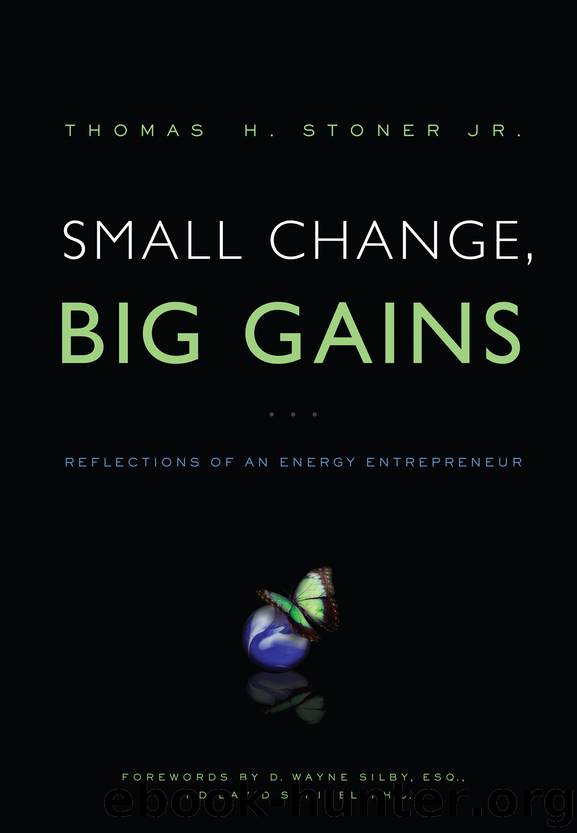Small Change, Big Gains by Thomas Stoner

Author:Thomas Stoner
Language: eng
Format: epub
ISBN: 9781626340039
Publisher: Greenleaf Book Group Press
Published: 2013-06-19T16:00:00+00:00
THE LIMITS OF NATURAL CAPITAL
Natural capital is the other term, similar to the commons, that gets bandied about in relation to the use and management of our global resources. It is a useful term as we continue in search of a sustainability model that can be applied to the world’s energy resources.
In the 1970s, German-born E. F. Schumacher (whom I mentioned in chapter 5) borrowed the concept of natural capital from Charles Galton Darwin (whom I discussed in chapter 7). Dalton had used the term to describe resource depletion in his book The Next Million Years. Schumacher argued that the global community must preserve its natural capital if we are to find a sustainable solution to our consumption of limited resources. He used the term natural capital to describe limited and valuable natural resources, such as coal and oil, that could not be replaced or substituted by other forms of energy. Schumacher felt that such a distinction was critical. He wanted to make a fundamental and crucial observation regarding the energy crisis facing the world at that time. In his argument, he emphasized the importance of the coal industry in the United Kingdom as a unique resource to that nation’s economy. He argued that the liberal burning of this natural capital was equivalent to using your savings account to buy the staples for everyday life. Moreover, if you think you are deriving revenue from the burning of coal and oil, Schumacher said, you are grossly mistaken. You are confusing spending your savings account with generating an income!
Schumacher’s work was revolutionary at the time. His use of the term natural capital created a movement to look for alternative energy supplies such as wind and solar energy. In fact, he referred to wind and solar as “income fuels” because they did not deplete the earth’s natural capital as burning coal and oil did. His work also influenced the growth of organic farming, which minimizes the use of fertilizers and oil-based pesticides to preserve the regenerative qualities of the earth’s limited supply of soil. Schumacher’s revolutionary theories were embodied in the very title of his book, Small Is Beautiful.208
The concept of calling oil and coal “natural capital” and renewable energy sources such as solar power “income fuels,” however, is difficult to extend into a workable sustainability model. The oil and gas industries have already incorporated the concept of depletion as a cost to the supplier in their use of resource management accounting. Amory Lovins (also mentioned in chapter 5), L. Hunter Lovins, and Paul Hawken attempted to extend the metaphor of natural capital into a sustainability model in their book Natural Capitalism, published in 2000, by criticizing industry practice. They used the term natural capital as a replacement for Garrett Hardin’s term commons, defining it as containing both renewable and nonrenewable resources that needed to be preserved in order to maintain their economic value.209 By going down this path, the Lovinses and Hawken discarded the benefit of Schumacher’s definition of natural capital, because
Download
This site does not store any files on its server. We only index and link to content provided by other sites. Please contact the content providers to delete copyright contents if any and email us, we'll remove relevant links or contents immediately.
Life 3.0: Being Human in the Age of Artificial Intelligence by Tegmark Max(5557)
The Sports Rules Book by Human Kinetics(4385)
The Age of Surveillance Capitalism by Shoshana Zuboff(4291)
ACT Math For Dummies by Zegarelli Mark(4047)
Unlabel: Selling You Without Selling Out by Marc Ecko(3662)
Blood, Sweat, and Pixels by Jason Schreier(3623)
Hidden Persuasion: 33 psychological influence techniques in advertising by Marc Andrews & Matthijs van Leeuwen & Rick van Baaren(3565)
The Pixar Touch by David A. Price(3437)
Bad Pharma by Ben Goldacre(3427)
Urban Outlaw by Magnus Walker(3395)
Project Animal Farm: An Accidental Journey into the Secret World of Farming and the Truth About Our Food by Sonia Faruqi(3221)
Kitchen confidential by Anthony Bourdain(3089)
Brotopia by Emily Chang(3053)
Slugfest by Reed Tucker(3002)
The Content Trap by Bharat Anand(2924)
The Airbnb Story by Leigh Gallagher(2854)
Coffee for One by KJ Fallon(2636)
Smuggler's Cove: Exotic Cocktails, Rum, and the Cult of Tiki by Martin Cate & Rebecca Cate(2540)
Beer is proof God loves us by Charles W. Bamforth(2461)
